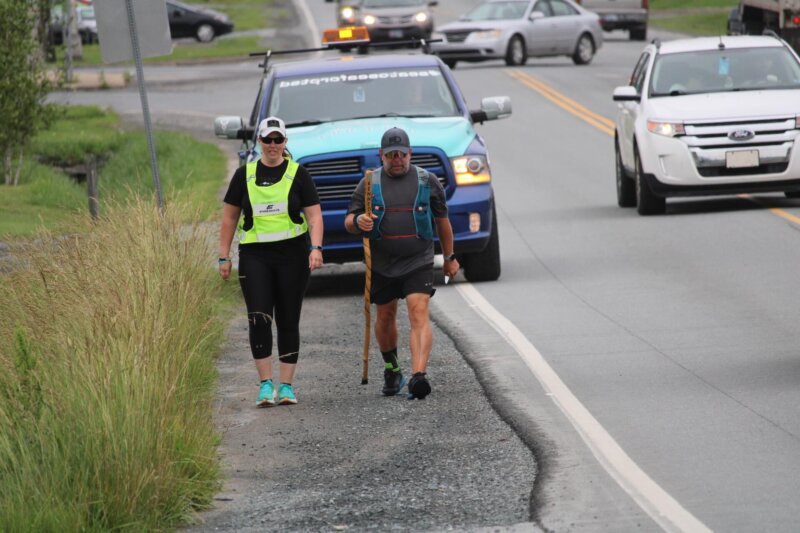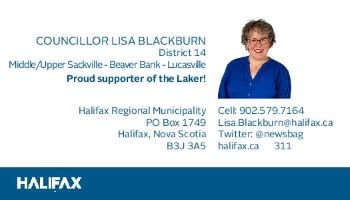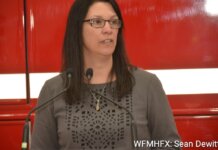MAIN PHOTO: Chad Kennedy (right) and support walker Lisa along with the support vehicle driven by Rick go along Hwy 214 in Elmsdale towards Hwy 102 as they head to Halifax on the Sea to Sea for PTSD Walk on July 11. (Healey photo)
ELMSDALE: Chad Kennedy hopes if one thing comes from his cross Canada walk Sea to Sea for PTSD its that there’s more “critical conversations” around Post-Traumatic Stress Disorder (PTSD).
Well, he hopes two things come—more awareness and discussion on PTSD and its impacts, and if one person is saved from his walk then its been a success.
Kennedy’s story on how the walk came about is one of accountability, while also inspiring.
The Sea to Sea for PTSD Walk was passing through Stewiacke, where they met some of the volunteer firefighters, Mayor and at least one councillor on July 10, before continuing towards Halifax, where they hope to be by the July 15 weekend.
Kennedy, and his team of two – Lisa who acts as communications/support walker, and Rick Chorney who is safety, were at the Elmsdale Petro-Canada on Hwy 214 for a short break on the morning of July 11.
ADVERTISEMENT:
Kennedy said on August 2, 2020, he was ready to end his life, and even had a -plan to do so through self-medication and rum,
“In my drunken stupor I kind of put it out on social media that I was going to walk across Canada,” he said as he munched on some snacks and fuelled up for the remaining 15 kms or so on this day at the Petro-Canada. “I just stuck to it. It was something that I announced, and I could have taken away really quick and the whole world would have forgotten about it the next day.
“I decided to hold myself accountable and just start critical conversations with our public safety professionals, military, and veterans across the country in the hopes of saving one person from suicide. “
The first leg of Sea to Sea for PTSD started April 2022 in B.C. and concluded in Montreal. They stopped it to get Rick back home for surgery. They restarted from Quebec City on June 2, and are making their way to Halifax before they plan to go to PEI early next week for a couple days.
Kennedy said they will then continue the walk-through Nova Scotia towards Cape Breton and the ferry to Newfoundland and Labrador. The aim is to conclude the cross-country walk on Aug. 4 in St. John’s, NL.
ADVERTISEMENT:
It’s not all about the walk—they will be spending time doing a few touristy type things, visiting friends and locations while in the region. But the main reason to be this way is the walk.
In Stewiacke, firefighters came to see and talk to him along with councillor Pam Osborne and Mayor George Lloyd.
He said he was happy to be in Nova Scotia, a third visit here for him.
Kennedy was asked what the reaction has been along his journey, especially in the Atlantic Provinces.
“When we’re walking the support through honks and waves is phenomenal,” he said. “What’s really amazing is when we meet somebody on the side of the highway in the middle of nowhere that has followed the campaign and they run back towards me just for a hug or a thank you.
In fact, the support team had to run a supporter back to their vehicle near the Lantz Connector. The person walked with Kennedy and his team for a few kilometres to the Petro-Canada.
ADVERTISEMENT:
Kennedy said the support has been pretty amazing.
“Obviously when we’re not walking, I’m just another guy, another face in the crowd,” he said.
“But the truck itself sparks a lot of conversation.”
He said they plan to head to P.E.I. on July 17 and spend a few days there, see some old friends and do some walking and talking as well.
“We’ll come back over and continue through Nova Scotia for a little while longer, and then July 27 we’ll head over to Newfoundland,” said Kennedy.
ADVERTISEMENT:
VIDEOS from the walk on Hwy 214 and a brief summary interview by the Sea to Sea for PTSD truck at the Petro-Canada.
ADVERTISEMENT:
When asked what his hope is that people get as a message from his walk, it’s simple—that talking about mental health should just be a conversation.
“We shouldn’t be ashamed of our injuries, whether it’s a traumatic brain injury, PTSD, occupational stress injuries or anything similar,” he said.
“Whether we’re dealing with anxiety or depression, it should just be a normal conversation.
“We’re still functional human beings, but we have one of those injuries that that we call invisible.”
“Hopefully it inspires people just to start talking, especially after dealing with critical incidences, and having critical conversations.”


























